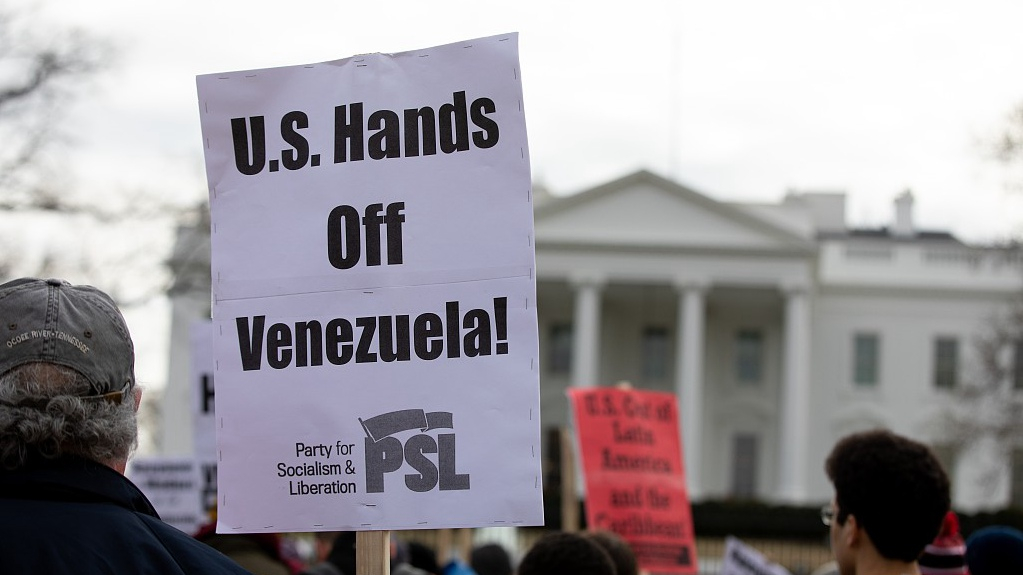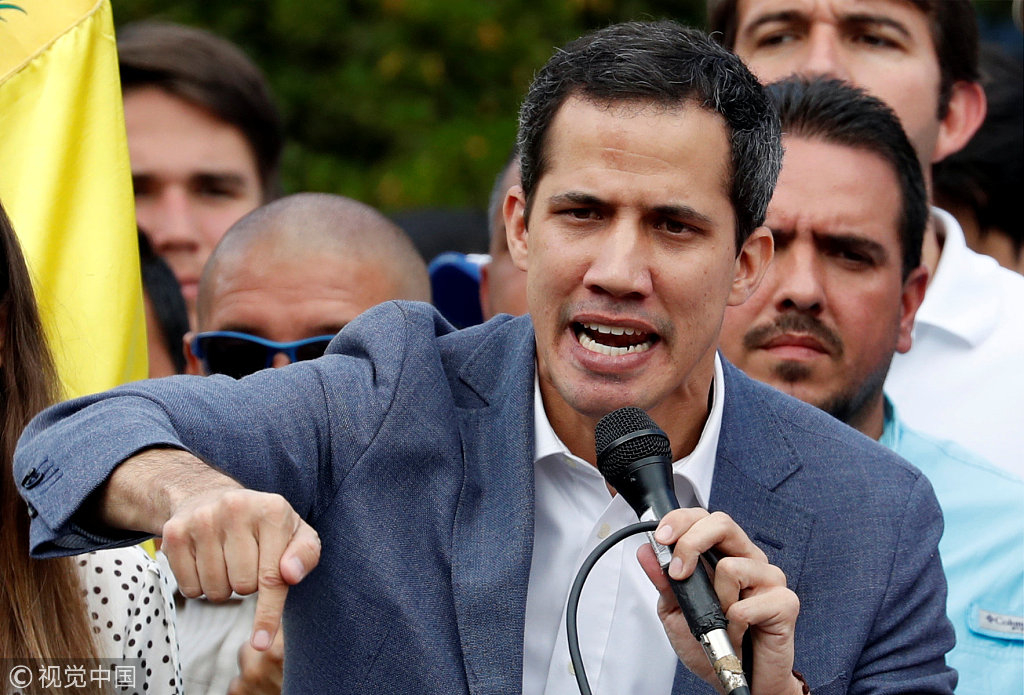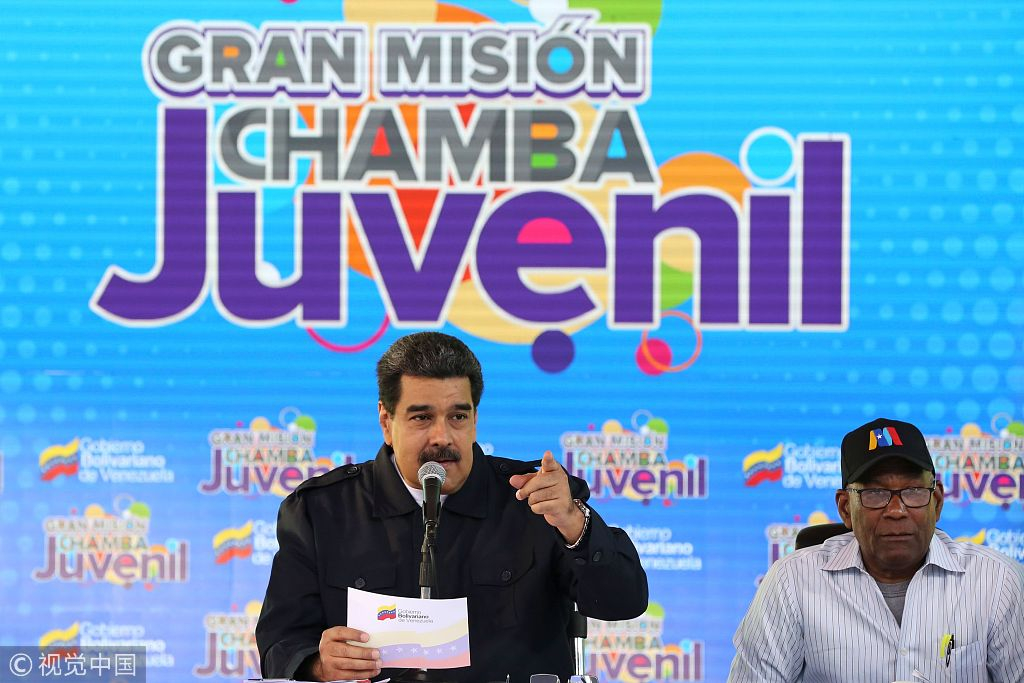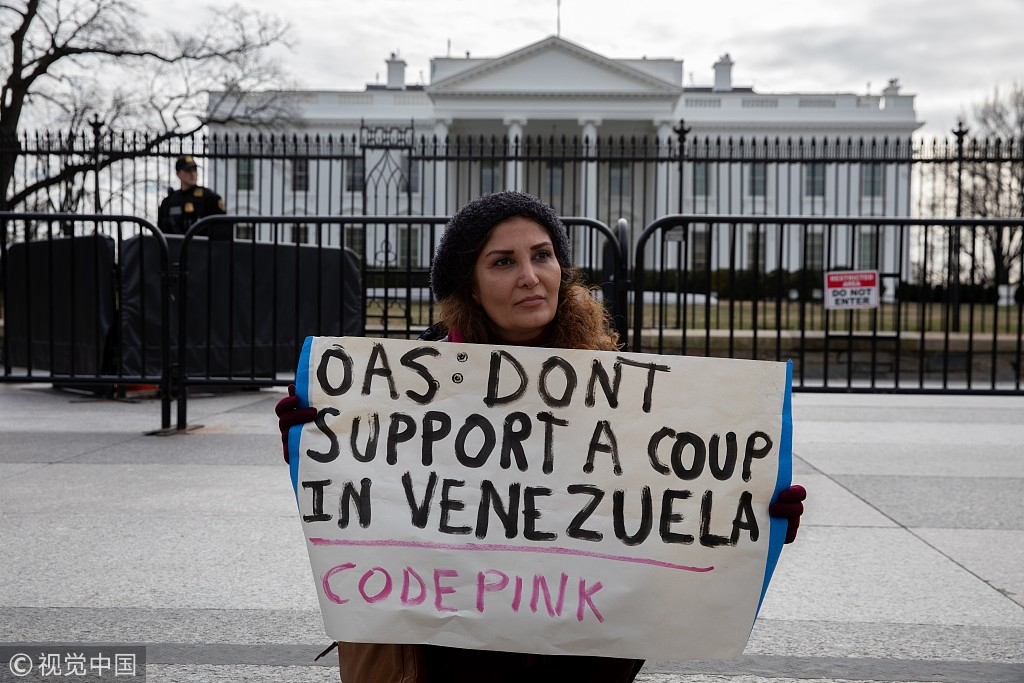
Opinion
10:09, 28-Jan-2019
U.S. should keep its hands off Venezuela
Jiang Shixue

Editor's note: Jiang Shixue is a professor at the Institute of Global Studies at Shanghai University. The article reflects the author's opinion, and not necessarily the views of CGTN.
The world is divided again. This time it's about Venezuela.
Nicolas Maduro's swearing-in ceremony took place on January 10, 2019. But less than two weeks later, on January 23, opposition leader Juan Guaido, a 35-year-old former engineer, declared himself the nation's “interim president.”

Venezuela's opposition leader Juan Guaido speaks during a rally in Caracas, Venezuela, January 26, 2019. /VCG Photo
Venezuela's opposition leader Juan Guaido speaks during a rally in Caracas, Venezuela, January 26, 2019. /VCG Photo
People are surprised to see that Venezuela has two presidents. But this is not worthy of celebration. As a matter of fact, it represents the beginning of a new crisis for this poor but oil-rich South American nation.
The United States seems well prepared for this worsening crisis in its backyard. One day before Guaido's ceremony, on January 22, Vice President Mike Pence used a video address to directly urge Venezuelans to go to the streets to show support for the self-proclaimed president. “We stand with you, and we will stay with you until democracy is restored and you reclaim your birthright of Libertad,” Pence said in his speech.
Soon after the 9/11 attack, George W. Bush, then U.S. president, said, “Every nation, in every region, now has a decision to make. Either you are with us, or you are with the terrorists.”

Venezuelan President Nicolas Maduro (L) speaking during a television program in Caracas, January 26, 2019. /VCG Photo
Venezuelan President Nicolas Maduro (L) speaking during a television program in Caracas, January 26, 2019. /VCG Photo
Now the U.S. wishes to divide the world again. In his remarks at the United Nations Security Council meeting on Venezuela on January 26, Mike Pompeo, U.S. secretary of state, said, “The United States stands with the Venezuelan people.
"So far, many other nations have chosen to do the same and they too have recognized the legitimate government of interim President Guaido ... And now it's time for every other nation to pick a side. No more delays, no more games. Either you stand with the forces of freedom or you're in league with Maduro and his mayhem.”
Both Pence and Pompeo say the U.S. support the Venezuelan people. In reality, however, they have failed to remember that Nicolas Maduro was elected by the Venezuelan people.
In western democracy, the ballot is the best place to express people's wishes and hopes. The Venezuelan opposition won a victory in the National Assembly on December 6, 2015. But the opposition boycotted the presidential election on May 20, 2018. Who was to blame for the boycott?
In retrospect, people can easily conclude that the U.S. and the Venezuelan opposition orchestrated the whole drama so that, they wish, Maduro's presidential victory could be annulled, paving the way for Guaido's swearing-in.
One of the basic principles of the United Nations Charter and international law is non-interference in other nations' domestic affairs. In the age of globalization, as the world has become a global village, non-interference has become all the more important and relevant.
That is to say, Venezuela's affairs must be and can only be dealt with by the Venezuelan people. As Hua Chunying, Chinese foreign ministry spokesperson, noted at a press conference on January 25, 2019, “China maintains that all countries should abide by the purposes and principles of the UN Charter, especially the norms governing international relations and the principles of international law such as non-interference in each other's internal affairs, mutual respect for sovereignty and territorial integrity and no threat of force.”

A woman holds a placard in support of Venezuela's President Nicolas Maduro in front of White House in Washington, January 26, 2019. /VCG Photo
A woman holds a placard in support of Venezuela's President Nicolas Maduro in front of White House in Washington, January 26, 2019. /VCG Photo
Whether or not the U.S. will overthrow the Venezuelan government with military force is anybody's guess. But people in Latin America and elsewhere will not forget that the U.S. militarily intervened with the domestic affairs of the Dominican Republic in 1965, Grenada in 1983, and Panama in 1989.
Luckily, this time, all the Latin American countries are opposed to U.S. invasion against Venezuela despite the fact that some of them support Guaido and the opposition.
Regrettably, in his UN speech, U.S. Secretary of State Pompeo also criticized China and others for the turmoil in Venezuela. This kind of accusation is groundless.
China's economic ties with Venezuela is a kind of South-South cooperation based on a win-win principle. It never targets against any third party. Moreover, Chinese investment and loans have helped Venezuela to promote economic and social development.
Needless to say, in the past two decades or so, the Chavez and the Maduro administrations have made some mistakes in economic and political fields. But this fact should not be the pretext for the U.S. and others to intervene in Venezuela's internal affairs.
It seems that, according to the hegemonic logic, right is not always might, but might is always right.
(If you want to contribute and have specific expertise, please contact us at opinions@cgtn.com.)

SITEMAP
Copyright © 2018 CGTN. Beijing ICP prepared NO.16065310-3
Copyright © 2018 CGTN. Beijing ICP prepared NO.16065310-3